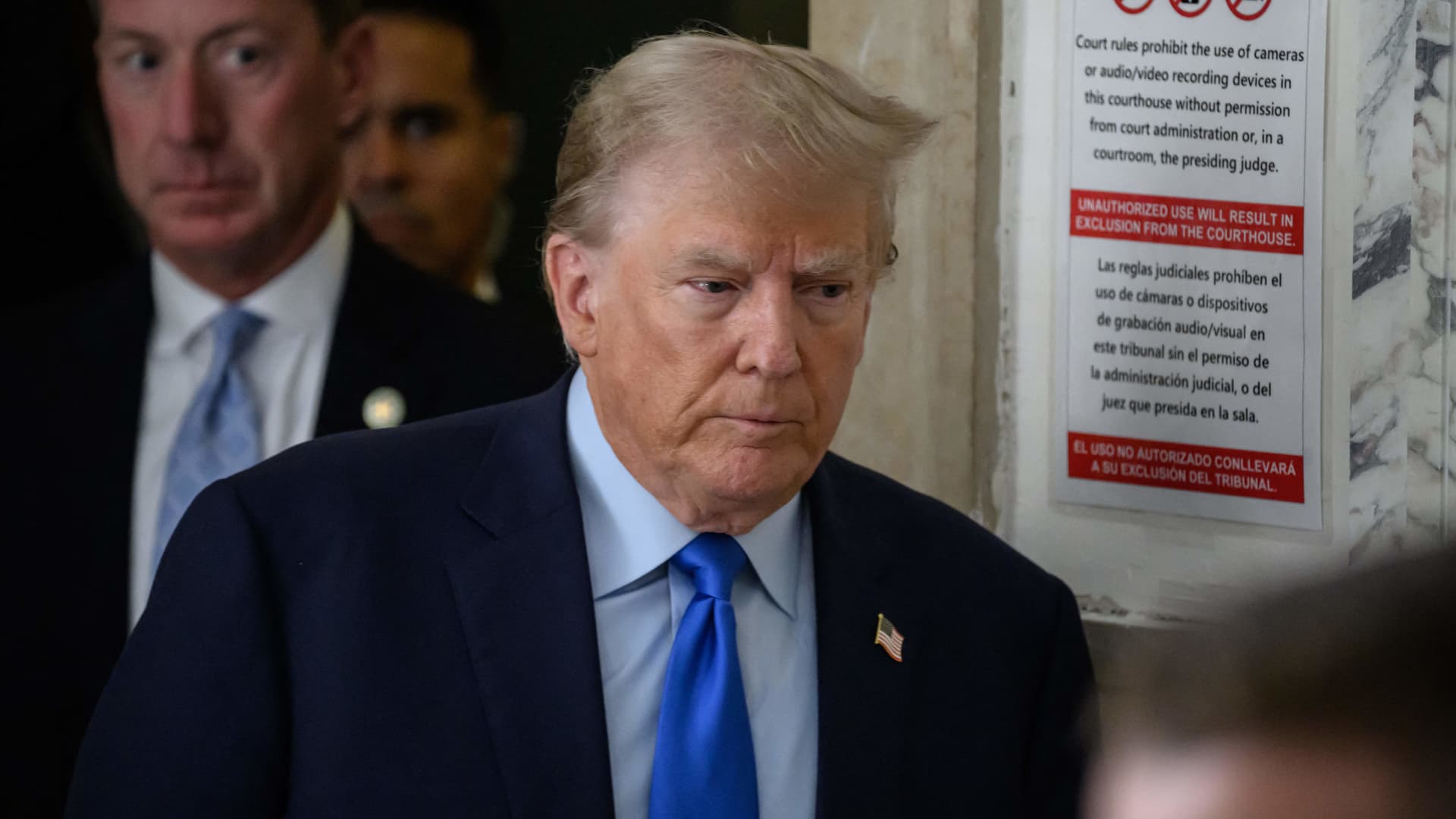
Former U.S. president Donald Trump arrives to the court room following a break at the New York State Supreme Court on the first day of his civil fraud trial, in New York City on Oct. 2, 2023.
Ed Jones | AFP | Getty Images
An appeals court judge Wednesday denied a request by former President Donald Trump to pause enforcement of the $454 million judgment he was ordered to pay in his New York civil fraud case.
But Judge Anil Singh’s ruling in Manhattan Supreme Court allows Trump and his two adult sons to stay in control of their companies while the former president seeks to appeal the massive fine.
The Trumps can also continue to apply for loans from financial institutions chartered or registered in New York during this time, the judge ruled.
Trump’s attorneys earlier Wednesday had offered to post a $100 million bond to stay the judgment while Trump appealed it, saying it would be “impossible” to secure a “complete” appeal bond.
If Trump were forced to put up a bond for the entire amount, his lawyers wrote, “properties would likely need to be sold to raise capital under exigent circumstances” to raise the money.
New York Attorney General Letitia James, who brought the fraud case, responded saying that concession shows Trump “has insufficient liquid assets to satisfy the judgment.”
“There is no merit” to Trump’s claim that “a full bond is unnecessary” if they post a partial amount of “less than a quarter of the judgment,” James said as she urged the appeals court to deny Trump’s request.
The filings came two days after Trump appealed Judge Arthur Engoron’s ruling finding him, his two adult sons, his company and its executives liable for submitting fraudulent information on key financial statements.
Engoron ordered the defendants to pay a total of $464.6 million in fines and interest. Trump’s total was more than $454 million, which includes more than $98 million in prejudgment interest. This interest continues to accrue at a 9% annual rate, adding nearly $112,000 a day to Trump’s bill alone.
Engoron’s judgment also bars Trump from running a business in New York for three years, or applying for loans from financial institutions registered with the state during that period.
Trump’s attorneys noted in Wednesday’s filing that a surety bond agency will often set the bond amount at 120% of the judgment to account for interest and appeal costs. In this case, the bond could be worth upward of $550 million.
“The exorbitant and punitive amount of the Judgment coupled with an unlawful and unconstitutional blanket prohibition on lending transactions would make it impossible to secure and post a complete bond,” they wrote.
“Appellants nonetheless plan to secure and post a bond in the amount of $100 million.”
That amount would be enough to “adequately” secure a stay of the judgment, they wrote, because it would be coupled with the oversight measures relied on by James’ office.
The defense attorneys also noted that their clients’ vast real estate holdings in New York are being overseen by a court-appointed financial monitor to “preclude any dissipation or transfer of assets.”
That oversight alone would be “sufficient to adequately secure any judgment affirmed,” they wrote. “Appellants’ bond would simply serve as further security.”
But James’ filing shot back, saying, “These are precisely the circumstances for which a full bond or deposit is necessary.”
“Defendants have never demonstrated that Mr. Trump’s liquid assets could satisfy the full amount of the judgment,” the attorney general wrote.
She added, “there is substantial risk that defendants will attempt to evade enforcement of the judgment (or make enforcement more difficult) following appeal.”
Engoron’s judgment is not the only massive legal bill dogging Trump as he seeks the Republican presidential nomination. Trump in late January was ordered to pay $83.3 million after a federal jury in New York found him liable for defaming writer E. Jean Carroll.
Trump has vowed to appeal that judgment.
This is developing news. Please check back for updates.
Don’t miss these stories from CNBC PRO:
